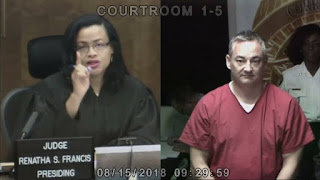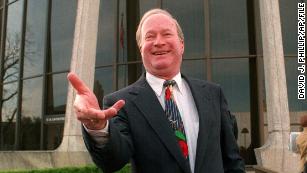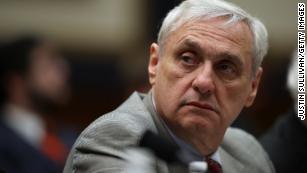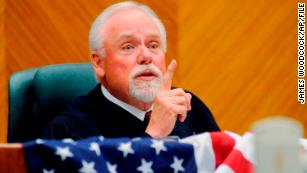A 71-year-old Marshall man died Monday following a motorcycle crash on Va. 55.
The collision happened about 5:50 p.m. Sunday just south of Interstate 66.
Gregory
David Bodoh, 71, of Marshall, was traveling east on 55 on a 2013 Harley
Davidson when a westbound 2005 Ford F150 made a left turn in front of
him, said state police Sgt. Les Tyler.
Bodoh was flown by helicopter to Inova Fairfax Hopsital where he died of his injuries about 1 a.m. Monday, Tyler said.
The truck’s driver, David P. Prause of Broad Run, has not been charged.
A 71-year-old Marshall man died Monday following a motorcycle crash on Va. 55.
The collision happened about 5:50 p.m. Sunday just south of Interstate 66.
Gregory
David Bodoh, 71, of Marshall, was traveling east on 55 on a 2013 Harley
Davidson when a westbound 2005 Ford F150 made a left turn in front of
him, said state police Sgt. Les Tyler.
Bodoh was flown by helicopter to Inova Fairfax Hopsital where he died of his injuries about 1 a.m. Monday, Tyler said.
The truck’s driver, David P. Prause of Broad Run, has not been charged.
On the surface, Daryl Bank looks like a local businessman who has made it big.
His
face is on the cover of books offering financial advice. His voice was
broadcast on radio stations here and in more than two dozen other
markets around the country.
His Virginia Beach-based company,
Dominion Investment Group, has 10 offices in seven states and offers a
"full range of financial services" with a network of more than 200
independent consultants, according to its website.
But
Bank, a 1988 graduate of Chesapeake's Indian River High School, has
been sanctioned by federal regulators, and his business is facing
serious allegations in Virginia and Arizona.
In 2010, he was
permanently banned from registering as a broker in the U.S., and his
longtime business partner, Roger Hudspeth, a 1986 graduate of
Portsmouth's Churchland High, was fined $5,000 and suspended for 30
days.
The Securities and Exchange Commission filed a civil
complaint in April against Bank and others in Arizona, alleging they
illegally took millions of dollars from clients.
On July 27, Bank
was arrested in Port St. Lucie, Fla. Police say he pointed a gun at a
woman who was trying to serve him with civil court papers.
And
Thursday, at a State Corporation Commission hearing in Richmond,
regulators could decide whether to temporarily stop Bank and several
associates from operating in Virginia while investigators continue to
look into allegations of fraud.
Despite the civil sanctions, Bank
and Hudspeth have been pitching their services and selling illegal
products, federal and state securities regulators say.
Bank's
radio show, "Daryl & the Bull," aired Saturday afternoons on AM 1650
in Hampton Roads until mid-July, when the station pulled the program
after being contacted by The Pilot.
Until recently, Hudspeth
hosted free seminars for seniors about maximizing their Social Security
benefits. And the company's YouTube channel - flush with recordings on
topics from tax preparation to investing in diamonds - was updated as
recently as July 31.
Two elderly Hampton Roads women told The
Pilot they each have invested more than $100,000 with Dominion
Investment Group. They spoke to The Pilot on the condition that their
full names would not be used.
Barbara, a 77-year-old from
Chesapeake, said she had worked with Hudspeth for a decade. She said she
lost at least $50,000 when one company ran out of money, and she's been
told by a Dominion employee she can't immediately access $25,000
invested in another company.
Ann, an 86-year-old from Hampton,
said Bank was like a member of the family. She said she had no reason to
believe her money was in jeopardy until the FBI came to her home to ask
about the investments.
Afterward, she tried to pull her money out
of a company, but she said Dominion told her it had to find another
investor to buy her out.
Bank, 45, did not return calls seeking
comment for this story. Hudspeth, 46, declined requests for an interview
but confirmed Friday he no longer works for Dominion Investment Group.
He recently had been listed as a partner on the firm's website.
Tom
Sporkin, an attorney with Buckley Sandler LLP in Washington, who is
representing Bank and several of his companies in the Arizona case,
declined to discuss the allegations against his client: "I look forward
to vigorously defending Mr. Bank and the Dominion entities in court."
It
was not immediately clear whether Bank retained an attorney in Florida
after his recent arrest. He posted a $20,000 bond and was released,
according to a spokesman for the St. Lucie County Sheriff's Office.
Bank
was charged with two felonies: aggravated assault with a deadly weapon
and assault on an elderly person. Police allege he pointed a gun at a
69-year-old woman who was trying to serve him papers at his home. The
documents were related to a suit brought against Bank and his wife,
Catrina Davis, by Prudential Insurance Co., according to an arrest
affidavit.
Ann, the Hampton woman, and her daughter, Lanette, sat
in stunned silence in Ann's living room when The Pilot told them about
Bank's arrest and his previous problems with regulators. He used to sit
down with them once a year in that same room to go over Ann's portfolio.
"I
find it hard to believe, even now," Lanette said. "Because he's like
your best friend. He's like a part of the family when he comes over and
he's chit-chatting and he's talking."
___
It's not clear
when Bank and Hudspeth first met, but they were political science
majors at Old Dominion University around the same time. Hudspeth earned
his bachelor's degree in 1990; Bank graduated in 1993.
Bank first
registered as an "investment adviser representative" and broker with UBS
Financial Services Inc. in Virginia Beach in 1996, according to federal
databases. Hudspeth registered with Next Financial Group Inc. as a
broker in 2003 and as an investment adviser in Chesapeake in 2004.
From
2005 on, they were affiliated with the same firms, according to the
Securities and Exchange Commission, the government agency that registers
investment advisers, and the Financial Industry Regulatory Authority,
which oversees brokers. (FINRA is an independent, nonprofit organization
that enforces federal securities laws, but it is not an arm of the
government.)
Licensed brokers are allowed to sell stocks, bonds
and mutual funds. Investment advisers don't sell securities but can
recommend financial products to clients.
In 2003, Bank formed
Dominion Investment Group as an arm of Resource Bank, according to an
undated essay on the company's website. It went independent a few years
later as the economy crashed.
Bank and Hudspeth, the only employees at that point, were selling fixed annuities and insurance in Virginia Beach.
The
essay says about Bank: "Inspired by his dynamic history of overcoming
obstacles and taking risks that ultimately paid off, his mindset about
his business during this economically challenging time was exactly the
opposite from most businesses and financial firms. While everyone else
was preparing for the worst and scaling back, he had one thing on his
mind: expansion!"
Bank's and Hudspeth's troubles with federal authorities started in 2008, when FINRA filings accused both of misconduct.
Investigators
alleged that Bank and
a business partner,
Gregory Bodoh,
misappropriated $160,000 in commissions that belonged to the now-defunct
Bank of the Commonwealth and its subsidiary, Commonwealth Financial
Advisors LLC.
Bank was employed by Bank of the Commonwealth from
2005 to 2008 - separately from his work with
Dominion Investment Group.
According to FINRA, he funneled money to
Bodoh through an arrangement
with
Commonwealth Financial Advisors;
Bodoh then transferred the money
to a company owned by Bank, who kept most of it but returned some to
Bodoh.
Around the same time, FINRA accused Hudspeth of selling
shares of real estate investment trusts to clients in 2007 and 2008
without having the proper license.
Bank, Bodoh and Hudspeth
settled with FINRA in February 2010. None admitted guilt, but Bank and
Bodoh were permanently banned from the authority, meaning they could no
longer register as brokers or work for firms registered with it.
Bank
gave up his license and was "discharged" by the company he was
registered with,
Capitol Securities Management, according to FINRA's
broker database. Hudspeth was fined $5,000 and suspended for 30 days.
"Barring
an individual from the industry... is the strongest sanction FINRA can
assess," George Smaragdis, a spokesman for the authority, said in an
email to The Pilot. "While FINRA does not have the authority to bring
criminal charges against an individual or firm, FINRA can and does
actively refer hundreds of matters to the relevant authorities every
year."
Smaragdis said FINRA can't confirm whether information about particular cases was forwarded to law enforcement officers.
___
Bank moved
from Virginia to Port St. Lucie after being barred by FINRA, according
to an affidavit from the lead investigator of the Virginia State
Corporation Commission's Division of Securities and Retail Franchising.
The date was not specified.
Soon after
the FINRA settlements, Bank began expanding his public profile and
building a web of limited liability companies under the umbrella of
Dominion Investment Group. The operations in Virginia and Florida
expanded to offices in Arizona, Colorado, Delaware, Nevada and
Pennsylvania.
Bank's radio show is broadcast in 15 states,
according to the company website. Each show lasts 45 minutes to an hour,
covering topics such as annuities, taxes, identity theft and college
planning. Recent segments are called "Daryl & the Bull: Putting Your
Financial House in Order," featuring Bank and Bradley Sperling, a
Dominion employee, as "The Bull."
Colleen Dick, station manager
for Chesapeake-Portsmouth Broadcasting, the company that programs AM
1650 WHKT in Hampton Roads, said she was unaware of Bank's history with
FINRA or the recent civil complaints filed against him in Arizona and
Virginia.
The company paid WHKT to broadcast its show, Dick said.
Often, the commercials played between segments were advertisements for
Dominion.
"Attention, savers. Here's your chance to create up to
30 percent or more in cash flow," one commercial said in January 2014.
"Your $25,000 may create $10,000 or more of annual earnings. In these
times, we understand it's hard to make 4 percent, no less up to 30
percent, but there is an opportunity that exists that's proven itself
over the last nine years."
The narrator didn't identify the opportunity.
WHKT
took the show off the air early in July, the same week The Pilot called
to ask about it, Dick said. "Daryl & the Bull" was under a
year-long contract that started in October.
"We want to make sure
our listeners are not caught in the middle of anything, so that was
certainly part of it," Henry Hoot, regional vice president for
Chesapeake-Portsmouth Broadcasting, said when asked whether Bank's FINRA
ban contributed to the decision.
Bank also was a contributor to
two recent books published by Celebrity Press: "SuccessOnomics: Learn
The Secrets Of Success In The New Economy From Today's Leading
Entrepreneurs and Professionals" and "Get in the Game: The World's
Leading Entrepreneurs & Professionals Reveal How YOU Can Get Off the
Sideline and Start Improving Your Health, Wealth & Lifestyle."
In
both, Bank was one of dozens of contributors. J.W. Dicks, co-owner of
Celebrity Press, said his company Google searches all of its authors
before allowing them to be published, but Bank's history with FINRA did
not come to light.
"Obviously, you've brought concerns to me, particularly about the search," Dicks said. "You don't know what you don't know."
Bank paid $7,164 to be published in "SuccessOnomics" and $8,700 to be included in "Get in the Game," Dicks said.
For
an extra fee, the company prints individualized book covers with a
photo of the contributor on the front. Bank has his own "SuccessOnomics"
cover, and he hand-delivered a signed copy to Ann, the elderly client
in Hampton. Bank had been managing her family's money since the late
1990s, when she and her late husband met him at a seminar he hosted on
investing.
His chapter in the book - titled "One Day I'll
Succeed!" - recounts his experiences with Bank of the Commonwealth. He
said he and his partners anonymously reported "rampant fraud and
deception" to regulators and law enforcement, and then the bank's
president and CEO "spun a web of criminal accusations" against him.
"For
the first time in my life, I couldn't sleep," Bank wrote. "When I did
sleep, I awoke in a cold sweat with wild visions of the FBI breaking in
the door to my home or barging into my office and leading me away in
handcuffs."
He wrote that he was innocent, but "no one wants the FBI looking at you; this is not a good feeling."
___
In April,
the SEC filed a complaint in U.S. District Court in Arizona against
Bank and five other men, alleging they participated in a scheme to bilk
millions from investors through the sale of "cellular spectrum
licenses."
The complaint says the plan was orchestrated by David
Alcorn and Kent Maerki, both of Arizona, and a company they formed
called Janus Spectrum LLC. Bank and three others allegedly acted as
fundraisers by selling interests in a particular band of the wireless
spectrum they claimed would be sought by Sprint and other major
cellphone carriers.
In reality, the Federal Communications
Commission had limited the use of that band to protect public safety
airwaves, according to the complaint. It was mostly used by local law
enforcement officers and small businesses like pizza delivery companies.
A
Sprint representative told Alcorn in 2010 - two years before the first
securities offerings - that the company wouldn't be able to use the
spectrum he applied for because of federal restrictions, according to
the SEC. Alcorn was told again in 2011.
Documents say the group of
six men and 12 companies raised $12.4 million from 2012 to 2014, with
Bank bringing in much more than the others. Using several Virginia
Beach-based companies, Bank allegedly raised $8.2 million from 111
investors across the country - an average of about $74,000 per person.
Of that, he transferred $4.5 million to his personal and business accounts without the knowledge of his investors, the SEC said.
An SEC spokeswoman declined to comment on the case.
In
a response to the complaint, Bank and several of his companies denied
some of the allegations and claimed others were ambiguous or irrelevant.
They asked the court to dismiss the case.
A hearing has been set for Nov. 5 in Phoenix.
___
In 2012,
officials with the Virginia State Corporation Commission requested
documents from Hudspeth for a routine audit. Hudspeth signed a letter
claiming neither he nor the affiliate he was managing, Norfolk-based
Dominion Investment Advisors LLC, was selling securities.
When a
client complained to the SCC's securities division in 2014, an auditor
asked to examine the company's records. Hudspeth again denied having
sold securities, the documents said.
The division claims that
Hudspeth lied to officials both times and that he and his firm
unlawfully offered and sold unregistered securities for at least three
companies.
In one case, Hudspeth and his company allegedly told
clients the business he was selling stakes in was a "hands-free" and
"proven" franchise chain called Dental Support Plus, run by Maerki of
Arizona. But no stores ever opened, officials claim.
Barbara, the
Chesapeake woman interviewed by The Pilot, said she invested $110,000 in
2004 with Hudspeth after she sold her home. When the market crashed a
few years later, the woman told Hudspeth she wanted out of stocks, so he
suggested other investments.
She does not remember talking about
commissions, fees or costs with Hudspeth, according to a questionnaire
she filled out for the SEC's division of enforcement, which she provided
to The Pilot.
"I trusted him entirely," she wrote to the SEC. "He never discussed risks (only the profits) associated with my investments."
Hudspeth
gave her a stack of thorough documents outlining Dental Support Plus
before she signed. After she agreed to invest, she received several
binders of legal documents and newsletters, "which made the investment
look more legit and legal," she wrote.
She bought three franchise
units for $25,000 each, which was what she had left after leaving the
stock market. She expected to earn roughly $6,240 a year - but she told
the SEC she received just one dividend check for $99 between 2011 and
2015.
"I recall saying to him more than once, 'Treat me as if I
were your grandmother. Don't put me in anything that you wouldn't put
her in,' " she wrote.
When the woman became concerned about her
money, she asked to liquidate her account, but she said Hudspeth told
her he would first have to find another investor to buy her interests.
He eventually found a buyer for one unit, which left her with two shares
worth $50,000.
In August 2014, she received a letter explaining that Dental Support had run out of money and would stop operating.
Hudspeth
suggested she invest the $25,000 she recovered from Dental Support in
two other limited liability companies, she said. She agreed, but has
since been told by a Dominion associate that the company has to find
another buyer before getting her money back.
"The final straw was
when I was having an emotional conversation with Roger," she wrote to
the SEC. "Almost in tears, I said to him, 'Before I get my money from
this investment (Dental Support Plus), at my age, I might not be around
to recover my loss.' His response was, 'Then you won't have to worry
about it.' "
Upset,
she said she spoke to Bank about Hudspeth's comments and about her
failed investments - but he didn't offer her solutions.
"Why would you commit a 74-year-old (then), 77-year-old (now) to this type of investment?" she wrote.
Hudspeth's
attorney, Richmond-based Melissa Ann Conner, filed a response in April
rebutting the claims made by the securities division of the State
Corporation Commission: None of the investors who bought interests in
Hudspeth's ventures were technically "investment advisor" clients, and
they all presumably understood the disclosures they signed, and
therefore they knew they risked losing money.
The products also were exempt from registration requirements, Conner wrote.
The
securities division asked the SCC in February to revoke the investment
adviser licenses of Hudspeth and the company. It is seeking restitution
to investors, civil penalties and an injunction barring them from the
securities business in Virginia.
The division subpoenaed files
relating to Hudspeth months ago, but just one document had been
submitted as of last week. A "hearing examiner," who acts as a judge,
set a new deadline of Aug. 24 for the records to be filed.
The
state has also requested a temporary injunction against Bank and four of
his employees, "given the scope of the interrelated entities and
breadth of the defendants' potential violations of the act," according
to documents filed by Virginia's securities division in June. About
three dozen copies of the original injunction request were refused when
the commission attempted to deliver them to Dominion's offices in
Virginia Beach, according to documents filed in late July.
The SCC will hold a hearing to discuss the injunction request on Thursday in Richmond.
Through
Dental Support and other companies, Bank and his affiliates raised at
least $3.1 million from 75 Virginia investors, the filing said. They
also sold securities without the licenses they're required to have.
Still, the investigation isn't over.
"The
division is concerned that... the defendants will continue to offer and
sell the securities in violation of the act or transfer its sales
operations to other affiliated companies," the filing said.
Within
two weeks of the state's injunction request, Ann, Bank's client in
Hampton, was sent four nearly identical and unsigned letters from each
of the limited liability companies she had invested in through Dominion
Investment: PLI Management LLC, DV8 Group Management LLC, WeMonitor
Management LLC and Warped Cigar Management LLC.
"Due to taxes,
efficiency, and the desire to keep costs down, we have decided to move
the location" of three of the companies from Virginia to Florida, the
letters said; Warped Cigar had moved to Nevada.
"This does not affect you or your ownership rights in anyway in the new location," the four letters said.
After
Ann's husband died in 2002, at least $250,000 - nearly half of her nest
egg - shifted from traditional securities like stocks and mutual funds
to limited liability companies recommended by Bank, according to
Lanette, the woman's daughter, who lives in Suffolk.
A couple of
hundred dollars in quarterly dividends rolled in for years, but within
the past couple of years, Ann stopped receiving statements in the mail.
She
says the FBI visited her home last winter to ask about her investments
in PLI Management. Her daughter called Bank after the investigator left
to ask why the FBI had been to her mother's house. Bank, she said,
pointed the finger at a former employee, but reassured her that her
mother's money was safe.
Earlier this summer, Ann and Lanette
asked Bank's associate to liquidate the funds in PLI because they still
worried about the FBI involvement. The funds weren't liquidated,
according to Lanette.
When she asked for an explanation, she was
told by the associate that Bank needed to find a new buyer for a "cross
trade" but that he had "good news on one of the other holdings that he
would like to discuss," according to an email provided to The Pilot.
A
response to the state filed July 21 by Billy Seabolt, a Williamsburg
attorney with Family Wealth Law Group, who is representing Bank and the
other defendants, accuses the securities division of filing "aggressive
motions" before conducting a full investigation. Seabolt asked the
commission to strike down the injunction request.
The defendants have cooperated by providing paperwork when the state has requested it, Seabolt wrote:
"These
actions are not the actions of people who are seeking to break the law.
Though in today's overly regulated society, there might be some
'gotcha' issues by which a governmental entity can lay claim to."
Seabolt said investors were warned that they may face "total loss" when buying Dominion's "alternative products."
"Some clients have lost money but so have people who invested in
juno.com,
etoys.com,
pets.com,
altavista.com, Circuit City, K-mart, Sears... " he wrote.
___
Earlier this summer, a group of Florida residents received a postcard inviting them to a seminar called "Social Security Maximization."
The
meeting was at a community college north of Port St. Lucie. It was
hosted by Hudspeth, whose LinkedIn page touts his "fiduciary standard"
as one of his strengths: "by law, advice must be in client's best
interest."
A Pilot reporter pre-registered for the class, but
Hudspeth called the afternoon of the event and asked her not to attend.
He said she was too young to benefit from the information, and that he
had a waiting list of seniors who wanted to attend, so he needed her
seat.
"I have nothing to hide," he said, but declined to meet in person that day or in the future.
At
the event, an associate of Hudspeth's told the reporter to leave, then
shut the door. Before it closed, the reporter saw about a dozen people
in the room and empty seats at every table.
After the meeting, one
of the attendees, George Durr, 80, said he didn't feel pressured by
Hudspeth to buy financial products or transfer his money to Dominion
Investment Group. He was given an opportunity to provide personal
information, and he expected Dominion to contact him.
Several former Dominion Investment Group employees declined to be interviewed for this story.
Irv
Segal, who runs a company called Easy Land Deals in Scottsdale, Ariz.,
tried to set up a Dominion Investment Group office there in 2014. He
said Hudspeth taught him how to host Social Security seminars. The
venture didn't work out, so Segal abandoned plans for the branch.
"I
was trying to generate leads and Roger was going to be the key person
for talking to them about investments for retirement kind of stuff,"
Segal said. "I was trying to line people up for a review of their Social
Security situation.... If they were interested, then Dominion could
handle their investments for them."
Segal said he knew Bank and
Hudspeth through his work as a franchisee of the Dental Support Plus
venture a few years earlier. He said Hudspeth was a straight-shooter
with a more low-key style than Bank.
"He has charisma," Segal said of Bank. "You just can't stop listening to him talk."
On
his radio show, Bank's lilting Southern accent sometimes lapses into a
no-nonsense, rapid-fire delivery. In a January 2014 episode about scams
on the elderly, Bank recounted a call from a person he thought was
trying to swindle him:
"I played with him for five or 10 minutes,
but I abused him in a way that my wife had to have a talk with me
afterwards. But I gave him an abuse that I felt like he had earned...
because all I could think of is, had he called my grandparents or some
other senior in this community... he would have taken advantage of
people.
"It just absolutely inflamed me."
Ann said that when
she first dealt with Bank, he would show her pictures of his new wife,
his dog and eventually his two children, whose names she scrawled in her
address book. He'd ask about her family. His voice became so familiar
she recognized it immediately when he called.
One constant topic,
she remembered, was his grandparents. Bank liked to talk about his close
ties to them, especially when he was pitching a new investment. Over
and over, she heard him say, "I would never put you in anything that I
wouldn't put my grandparents in."




















